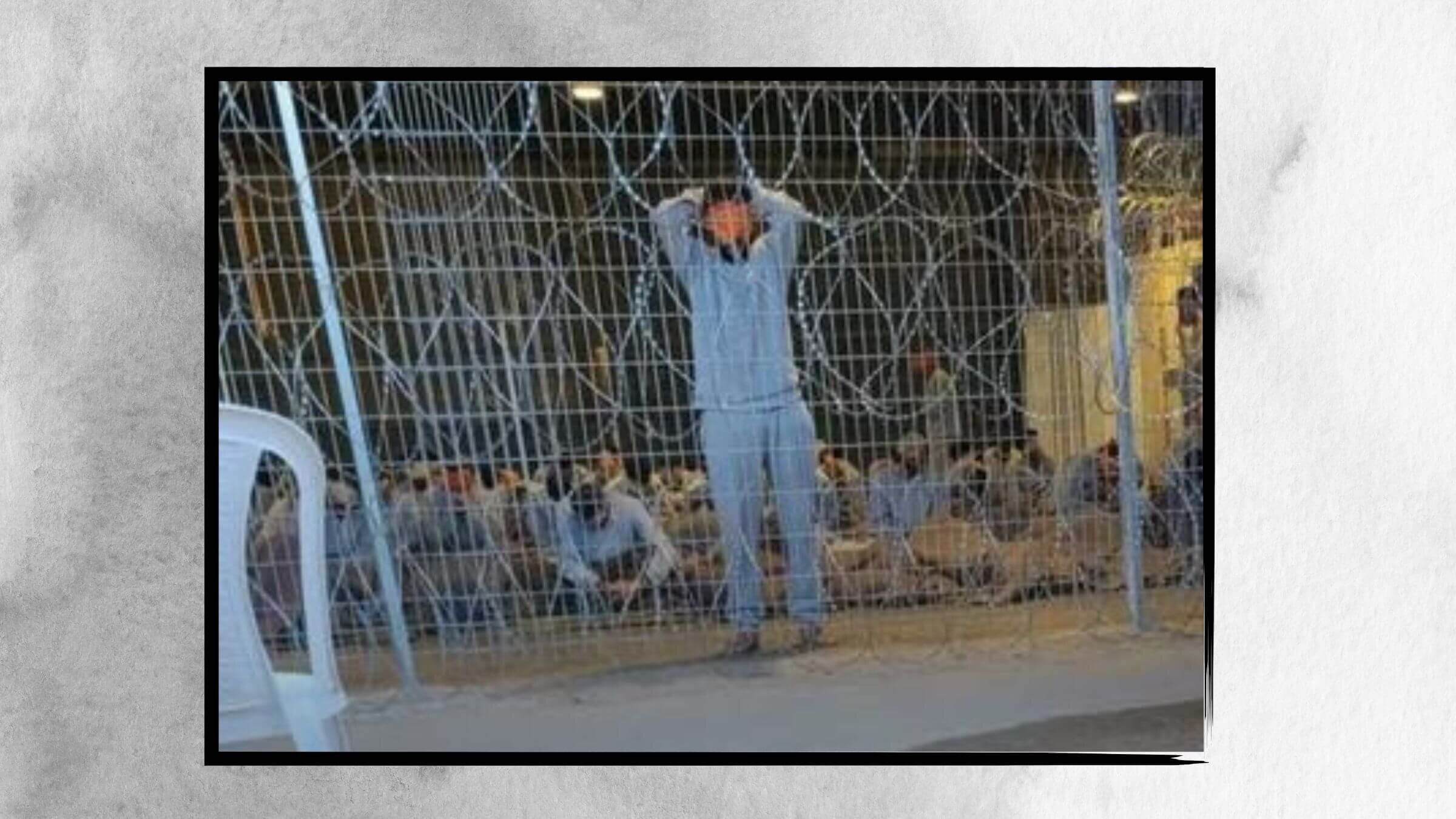If Israel cannot curb the horrific abuse of Palestinian detainees in its prisons, international tribunals will
It’s a very dangerous moment for human rights in Israel, and Israeli leaders could be held liable

Blindfolded Palestinian detainees inside the Israeli military prison camp Sde Teiman, May 2024. Photo by Obtained by CNN
Shocking evidence has emerged over the past several months of rampant abuses of Palestinian detainees held in Israeli prisons and military detention facilities.
Earlier this month, footage obtained by Channel 12 in Israel purportedly showed Israeli soldiers sexually abusing and torturing a Palestinian man being held in Sde Teiman, a military facility in the Negev desert. He suffered a ruptured bowel, severe injury to his anus, lung damage and broken ribs. The Israeli human rights organization B’Tselem also issued a report that included testimonies from dozens of Palestinians incarcerated by Israel since Oct. 7, documenting instances of alleged violence and even death.
Since Oct. 7, thousands of Palestinians (including Palestinian citizens of Israel, and Palestinians from the West Bank and Gaza Strip) have been incarcerated in Israeli facilities, often without trial as administrative detainees or so-called unlawful combatants. While there is a long history of Palestinians being abused under Israeli custody, including cases before the Israeli Supreme Court, in my 23 years following this issue as a civil rights lawyer, and currently as chair of the International Advisory Council of the Association for Civil Rights in Israel, I have never seen so much evidence of such wide scale abuses of detainees under Israeli custody.
Coupled with the increasingly dehumanizing discourse about Palestinians by some elected officials and a weakened Supreme Court that is still reeling from the Netanyahu administration’s efforts to curtail its powers, this is a dangerous moment for human rights in Israel. If the Israeli government does not act now to address these alleged abuses and end the policies and practices that allowed them to take place, international tribunals will likely intervene — an outcome that would place even more Israeli officials under international legal scrutiny and further alienate Israel from the international community. Arrest warrants could be issued, and Israel could further lose legitimacy as a nation committed to the rule of law.
The facts surrounding the mistreatment of Palestinian detainees are overwhelming. In March, an Israeli doctor at Sde Teiman sent a letter to Israel’s defense minister and attorney general, describing incarcerated Palestinians having their legs amputated after being handcuffed too tightly by all four limbs for 24 hours a day, while blindfolded and fed through straws. That same month, Haaretz dubbed Sde Teiman and Anatot, a base near Jerusalem, as “the Israeli Guantanamo,” documenting 27 Palestinians who had died in Israeli military custody.
In April, ACRI and Gisha, an Israeli human rights organization, jointly filed a petition before Israel’s Supreme Court challenging the starvation of Palestinians inside Israeli prisons post-Oct. 7. The organizations documented testimonies from Palestinian detainees suffering from extreme hunger, with diabetics resorting to eating toothpaste to raise their blood sugar level and others reporting losing dozens of pounds while in prison.
In a letter submitted during the litigation, the Minister of National Security, Itamar Ben-Gvir, admitted that he purposefully reduced the amount of food available to Palestinian detainees to worsen their conditions of confinement. The case is pending.
In May, ACRI, Physicians for Human Rights, Gisha, the Public Committee Against Torture in Israel and HaMoked, an Israeli organization that advocates on behalf of Palestinians living under Israeli occupation, again petitioned the Israeli Supreme Court to request that Sde Teiman stop accepting detainees and be closed. The Court issued a preliminary ruling shifting the burden of proof onto the government to show that the conditions at Sde Teiman abide by Israeli and international law. The case is also pending, while concerns remain about abuses in Sde Teiman and additional detention facilities.
In July, the United Nations Office of the High Commissioner for Human Rights issued a report documenting more allegations of abuse of Palestinian prisoners, including sexual and physical violence.
All these allegations, taken together, raise serious concerns under international humanitarian law, international human rights law and international criminal law. Multiple treaties and conventions are implicated, including the Convention Against Torture and other Cruel, Inhuman or Degrading Treatment or Punishment, which Israel ratified in 1991.
The International Criminal Court, which was formed in 2002 to prosecute individuals accused of committing international crimes such as war crimes and crimes against humanity, is already considering arrest warrants against Prime Minister Benjamin Netanyahu and Defense Minister Yoav Gallant related to Israel’s conduct in Gaza, but the abuses in military and prison facilities could lead to additional international legal action.
Israel and the United States are not among the 124 countries that are signatories to the ICC, and questions remain on whether the ICC would have jurisdiction over the treatment of detainees held in Israel. Yet the fact that many of the detainees were apprehended in Gaza and the West Bank would bolster the argument for ICC’s jurisdiction, as Palestinian authorities have accepted the ICC’s jurisdiction since 2015. If arrest warrants are issued, then ICC member states will be required to arrest the named individuals if they enter their territory and extradite them to The Hague.
Israeli officials appear to be slowly recognizing their legal liability under international law. In a letter sent to prison authorities in June by Ronen Bar, the head of the Shin Bet, he worried that “Israel is having difficulty repelling claims against it, at least some of which are well founded,” citing that certain acts Israel is reputably accused of having committed are international crimes that violate international treaties. Bar warned Israeli prison officials of the potential consequences of their actions.
“In addition to severely damaging Israel’s ability to achieve its goals in the war,” Bar elaborated, “this conduct also generates personal criminal exposure in international tribunals (ICC) and state courts.”
When Israeli military police arrested several soldiers in August for allegedly raping a Palestinian detainee (amid right-wing protests and riots against the arrests), some Israeli legal officials explained the arrests as protecting Israeli officials from prosecution by the ICC.
According to the Rome Statute that created the ICC, it is not supposed to intervene when a competent national authority conducts its own proceedings to hold individuals accountable. Israel does have an independent court system that could preempt the need for international intervention by engaging in genuine investigations and prosecutions of wrongdoers in its own domestic system.
But if Israeli justice and military systems fail to act appropriately, then the ICC could initiate an investigation. They will likely pay particular attention to Israeli officials such as Ben-Gvir, who has repeatedly confirmed that he personally ordered the worsening of conditions inside prisons.
American diplomats must make it clear that it is a priority for the United States to have Israel act immediately to end the abuses of Palestinians in its prisons and detention facilities and to hold offenders accountable. Following the attacks of Oct. 7, President Joe Biden warned Israel not to repeat the mistakes of the United States post-Sept. 11, which included the abuses that took place in Abu Ghraib and CIA black sites. Unfortunately, it appears that Israel is repeating them.
In its zealous desire to prosecute a war against Hamas and the other perpetrators of the heinous Oct. 7 attacks, Israel has needlessly eroded civil liberties in the name of national security. The rule of law, which is supposed to separate liberal democracies from illiberal regimes, is being abandoned when inconvenient for those in power. Former Israeli Supreme Court president Aharon Barak famously said: “We ourselves will not be humane if we do not ensure a level of humanity for the detainees in our custody.” If Israel does not hold itself accountable, the international community will do it for them.
















